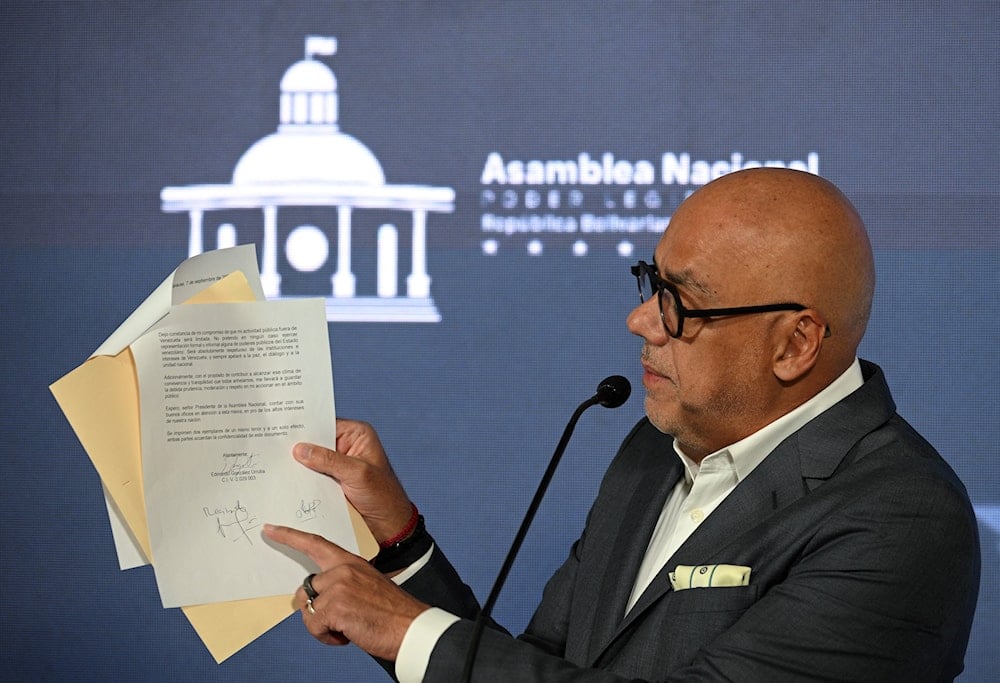Venezuelan authorities refute Gonzalez Urrutia's claims of 'coercion'
The Venezuelan National Assembly president provides details about the letter in which the opposition candidate conceded defeat to Nicolas Maduro in the presidential election.
-

The President of the National Assembly Jorge Rodriguez shows the alleged letter from opposition candidate Edmundo Gonzalez Urrutia during a press conference at the National Assembly in Caracas on September 18, 2024. (AFP)
Venezuelan far-right opposition presidential candidate Edmundo Gonzalez Urrutia claimed on Wednesday that he had been coerced into signing a letter, distributed by Venezuelan authorities, in which he conceded defeat to Nicolas Maduro in the presidential election.
In the letter, dated September 7 and addressed to National Assembly President Jorge Rodriguez, Gonzalez Urrutia stated, "I respect" the CNE electoral council’s declaration of Maduro as the winner of the July 28 election.
However, on Wednesday, the 75-year-old retired diplomat, now in Madrid where he was granted asylum after weeks in hiding in Venezuela, posted a message on X, in which he claimed that he was forced to sign the letter in exchange for being allowed to leave the country.
According to Gonzalez Urrutia, Maduro’s aides brought the letter to him at the Spanish Embassy in Caracas, and he was given an ultimatum: "I had to either sign it or deal with the consequences."
He described the experience as "very tense hours of coercion, blackmail and pressure. At that point, I considered I could be of more use free than if I were imprisoned."
But in an interview for teleSUR, National Assembly President Jorge Rodriguez provided details about the letter, affirming that Gonzalez Urrutia signed it with his own pen.
Rodriguez noted that the process involved a commitment to keep Gonzalez Urrutia’s letter "in reserve". He added that the only condition for delivering the letter was that Gonzalez Urrutia sign every page of it, ensuring no future claims that Venezuelan authorities tampered with its content.
The senior Venezuelan official further noted that the former candidate personally chose to hand the letter over to him.
"Some people close to him (Edmundo Gonzalez Urrutia) contacted me and raised the possibility of having some exchanges with Mr. Gonzalez Urrutia for his intention to apply for political asylum in the Kingdom of Spain," he explained, adding that he was requested to meet with the opposition candidate on September 6.
Rodriguez also highlighted that the political asylum process, fully documented by the Venezuelan government, was a two-party negotiation involving Executive Vice President Delcy Rodriguez and the Spanish government.
This negotiation resulted in Venezuela providing the required safe conduct for Gonzalez Urrutia's departure, along with the approval for a Spanish Air Force aircraft to facilitate his journey.
The political crisis in Venezuela has intensified since authorities declared incumbent President Maduro the winner of the July 28 election. The opposition has rejected the results, claiming that Gonzalez Urrutia had won by a wide margin.
Several countries, including the United States, the European Union, and multiple Latin American nations, have refused to recognize Maduro’s victory until Caracas provides a detailed breakdown of the election results.
However, the country’s electoral authority has been unable to provide a full breakdown of the election results, attributing the delay to a cyberattack on its systems.
In the aftermath of the election, Venezuelan prosecutors issued an arrest warrant for Gonzalez Urrutia due to his continued claims that he was the legitimate victor.
Before leaving the country, the far-right candidate had been in hiding for a month, ignoring three summonses to appear before prosecutors.
Western-backed post-election riots in Venezuela have resulted in 27 deaths and 192 injuries, with the government reporting around 2,400 arrests.
Read more: EU's Borrell in 'ash heap of history': Venezuela's FM

 4 Min Read
4 Min Read








